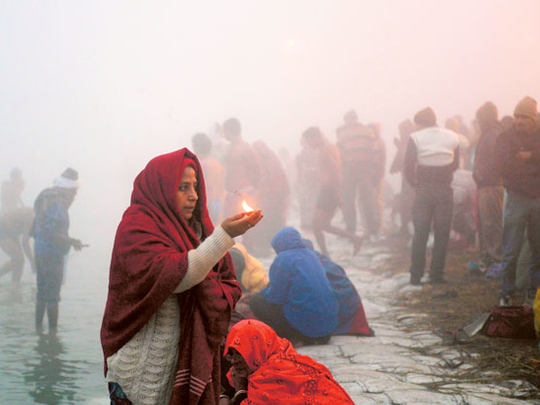
Mumbai: Ahead of the kite-flying festivities during the Hindu harvest festival Makar Sankranti, to be celebrated on Thursday, Maharashtra state has warned about safety risks — not just to humans but also birds.
Thousands of children will be taught about solar energy as a non-polluting fuel to cook on the day.
Maharashtra Governor Vidyasagar Rao will inaugurate the Maha Suryakumbh, a solar cooking festival featuring schoolchildren, at Patwardhan Garden, Bandra, on Thursday morning along with Union Minister of State for Power, Coal and New and Renewable Energy, Poonam Mahajan.
Various lawmakers are also expected to attend.
“After the success of Suryakumbh, the largest solar cooking festival in January 2014, our NGO Keshav Srushti is now organising the Maha Suryakumbh which will be attended by around 15,000 schoolchildren at different locations in Mumbai,” Jagdish Patil, who is part of the festival’s organising team, told Gulf News. “The students will learn how to save energy and also improve our environment by cooking with clean solar energy,” he said.
He said the subsidised cost of participation is Rs300 (DH18) that will include the solar cooker, an aluminium sheet that draws the sun’s rays, which normally costs Rs450, along with a packet of instant noodles that normally take three minutes to cook but 20 minutes in the solar cooker with a little water.
This is the second year “that this simple activity” is being played out and last year, “Keshav Srushti became the distinguished recipient of the Guinness World Records for Suryakumbh — the largest ‘Solar Cooking Festival’ with 3639 participants,” he said.
Meanwhile, the kite-flying celebrations have drawn warnings from power utility Tata Power, which held awareness campaigns in the city asking people not to fly kites in the vicinity of Extra High Voltage (EHV) lines.
It said that kite strings, when in contact with the transmission lines, allow high voltage current to pass through them and can therefore fatally electrocute the person flying the kite. The company’s division officers and senior transmission line staff have been conducting awareness programmes on Electrical Safety at Home and Hazards of Flying Kite in the vicinity of EHV lines.
They have also cautioned that if a kite gets stuck on a power line, people are to let go off the string and move away from the area. Tata Power has conducted a total of 170 sessions and has reached out to more than 22,000 citizens and schoolchildren.
Other cautionary words come from activists who have been urging people not to use kite strings or yarn (manjha) dipped in glass powder and chemicals to make it withstand the wind.
This not only causes injury to people but also to birds, they said.
Bird lovers have been asking people to refrain from flying kites but at the same time have been preparing to treat injured birds. This time, however, even municipal officials have decided to raise awareness among the people that flying kites can pose a danger to birds.
Helplines have been set up, pamphlets distributed and a team of veterinary doctors have been also organised during the festival to treat the injured birds. --end












